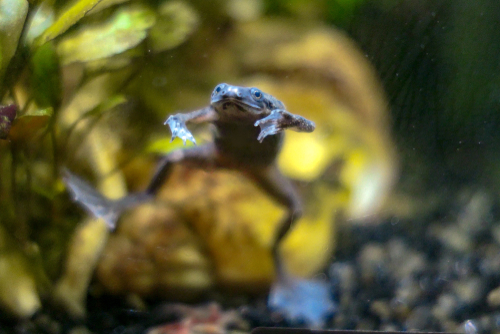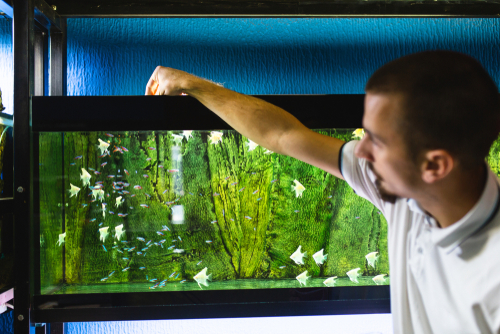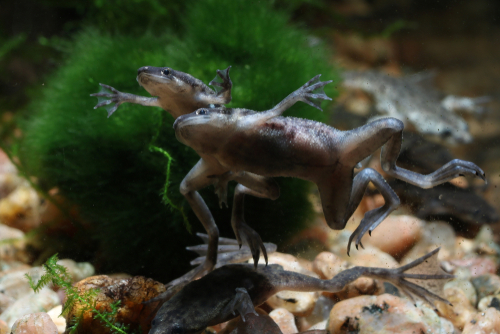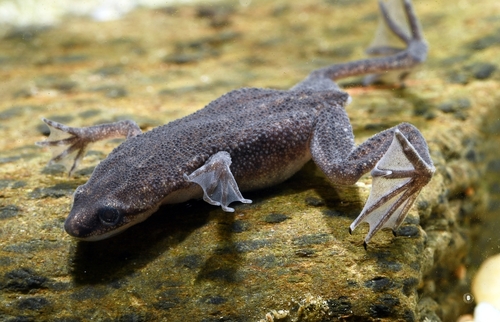African Dwarf Frogs are fascinating creatures that are becoming increasingly popular as pets. These tiny amphibians are native to Africa and require specific care to thrive in captivity.
One of the most important aspects of caring for them is providing them with a suitable diet.
Understanding what to feed them is crucial for their health and well-being. In their natural habitat, these frogs are omnivores, meaning they eat both plant and animal matter.
However, in captivity, their diet must be carefully balanced to ensure they receive the nutrients they need. This article will explore the ideal diet for African Dwarf Frogs and provide tips for ensuring they receive proper nutrition.
Contents
Key Takeaways on What to Feed African Dwarf Frogs
- These are native to Africa and require specific care in captivity.
- In their natural habitat, these frogs are omnivores, but their diet must be carefully balanced in captivity.
- Providing a varied diet that includes both animal and plant matter is crucial for their health.
Check out these other posts in this category:
Understanding African Dwarf Frogs

Physical Characteristics
African Dwarf Frogs are small aquatic frogs that can grow up to 2.5 inches in length. They have four webbed feet and no claws. Their skin is smooth and slimy, and they are generally olive green in color. They are nocturnal, which means they are most active at night.
Habitat and Behavior
In the wild, these can be found in slow-moving rivers and streams in Central Africa. They are social animals and live in groups. In captivity, they require a minimum of a 10-gallon tank with a secure lid to prevent escape.
They prefer a water temperature between 72-82°F and a pH between 6.5-7.5. ADF are peaceful creatures and can be kept with other non-aggressive fish species.
Health Issues
They are generally hardy and easy to care for, but they can be prone to stress-related illnesses. Stress can be caused by a variety of factors, including poor water quality, overcrowding, and inadequate nutrition.
Signs of stress in them include lethargy, loss of appetite, and abnormal behavior. It is important to monitor their health regularly and provide a healthy and stress-free environment for them to thrive.
African Dwarf Frog Diet
Natural Diet
In the wild, African Dwarf Frogs are omnivorous, meaning they eat both plants and animals. They primarily feed on small insects, larvae, and crustaceans. They also consume algae, plants, and other small organisms found in their natural habitat.
Supplemental Foods
In captivity, African Dwarf Frogs can be fed a variety of foods to supplement their natural diet. Some common options include:
- Bloodworms: These are a popular choice and can be found frozen or live.
- Brine shrimp: Another popular option that can be found frozen or live.
- Tubifex worms: These can be found frozen or live and are a good source of protein.
- Small fish: can eat small fish, but it is important to ensure they are not too big and that they are not carrying any diseases.
- Insects: Small insects such as crickets and mealworms can be fed to them.
- Meat: They can eat meat, such as beef hearts, but it should be given sparingly.
It is important to ensure that any food given to African Dwarf Frogs is of high quality and provides the necessary nutrients and vitamins they need. Uneaten food should be removed from the tank to prevent overfeeding and obesity.
Feeding Schedule

African Dwarf Frogs should be fed daily, but it is important not to overfeed them. They are picky eaters and may not eat all of the food given to them.
A good rule of thumb is to feed them a few small pieces of food at a time and remove any uneaten food after a few hours.
In addition to their regular diet, African Dwarf Frogs can be given treats such as freeze-dried foods or live foods to provide additional variety and nutrition. It is important to ensure that any treats given are nutritional and not given too often.
Caring for African Dwarf Frogs
1. Housing
African Dwarf Frogs are small aquatic pets that require a tank of at least 5 gallons. It is important to provide them with hiding places such as plants and decorations to make them feel secure.
The substrate should be smooth and not rough to avoid damaging their delicate skin.
2. Water Quality
Maintaining good water quality is essential for the health of African Dwarf Frogs. The water should be kept clean and free of harmful chemicals. A filter can be used to help keep the water clean.
The temperature of the water should be monitored and kept between 72-78°F. The pH level should be kept between 6.5-7.5.
3. Temperature Control
African Dwarf Frogs require a consistent water temperature to stay healthy. A heater can be used to maintain the water temperature within the recommended range.
A thermometer should be used to monitor the temperature regularly.
4. Feeding Practices
African Dwarf Frogs are omnivores and can be fed a variety of foods such as pellets, frozen food, dried food, and live food such as snails.
It is important to provide a balanced diet and not overfeed them to avoid bloating. They can be fed once or twice a day, depending on their appetite.
African Dwarf Frogs in the Wild

Natural Habitat
African Dwarf Frogs are native to the tropical areas of Sub-Saharan Africa. They are found in slow-moving rivers, streams, and ponds with dense vegetation.
These frogs prefer shallow waters with temperatures ranging from 72-82°F. The water should be clean, well-oxygenated, and slightly acidic with a pH level of 6.5-7.5. The frogs are adapted to living in an aquatic environment and spend most of their time underwater.
Predators and Threats
African Dwarf Frogs have several predators in the wild, including fish, birds, and reptiles. They are also hunted by humans for food and the pet trade.
Habitat loss due to deforestation and pollution is another major threat to their survival. In addition, the introduction of non-native species such as crayfish and snails can disrupt the ecosystem and negatively impact the frog’s food supply.
In their natural habitat, African Dwarf Frogs feed on a variety of small aquatic creatures such as krill, insect larvae, and small fish.
They are scavengers and will also eat dead or decaying organic matter. These frogs require a diet rich in protein to maintain good health and growth.
Debunking Myths and Misconceptions: What Not to Feed African Dwarf Frogs

When it comes to the African dwarf frog diet, there are numerous myths and misconceptions floating around. So, what is the best food for African dwarf frogs? How does African frog food differ from what to feed frogs in captivity? Let’s debunk some common myths:
African Dwarf Frogs Can Subsist on Plant Matter
Some believe that African dwarf frogs can thrive on a diet of algae or plant-based flakes. This is misleading. African dwarf frogs are carnivorous by nature, requiring a diet rich in protein that plant matter cannot sufficiently provide.
It’s Okay to Overfeed As Long As the Food Is Nutritious
Even when providing the correct food, overfeeding is a common issue. African dwarf frogs will eat until they are visibly bloated, which can lead to obesity and other health issues. Proper portion control is as important as the right food.
Mealworms Are a Perfectly Good Food Source
Contrary to some opinions, mealworms are not suitable for your African dwarf frog food list. While they may be easy to find and offer, they don’t provide the nutritional balance that is essential for your pet’s well-being.
What to Feed Frogs in Captivity: A Brief Guideline
Providing a balanced diet that mimics what African dwarf frogs would eat in the wild is key. This includes:
- Live or frozen bloodworms, which are soft-bodied and easy to digest.
- Brine shrimp, as they’re an excellent source of protein and can be easily hunted in the water.
- Specialized frog and tadpole food pellets, which are formulated to offer a balanced diet.
Avoid the temptation of convenience and stick to a species-specific diet to maintain the health and vitality of your African dwarf frogs.
Frequently Asked Questions
How often should I feed my African dwarf frog?
African dwarf frogs should be fed daily, but only small amounts of food at a time. Overfeeding can lead to obesity and other health problems.
What are some suitable food options for African dwarf frogs?
African dwarf frogs are carnivorous and require a diet that is high in protein. Some suitable food options include bloodworms, brine shrimp, and small pieces of cooked meat.
Can African dwarf frogs eat fish flakes?
While fish flakes may be tempting to use as a food source for African dwarf frogs, they do not provide the necessary nutrients that these frogs need. It is best to stick to a diet of live or frozen foods specifically designed for African dwarf frogs.
What are some suitable tank mates for African dwarf frogs?
African dwarf frogs are peaceful creatures and do well with other peaceful fish species such as neon tetras, guppies, and corydoras catfish. It is important to avoid any fish that may be aggressive or may try to eat the frogs.
Do African dwarf frogs need any supplements in their diet?
African dwarf frogs do not require any supplements in their diet as long as they are being fed a variety of nutritious foods.
How much should I feed my African dwarf frog?
It is recommended to feed African dwarf frogs small amounts of food daily, about the size of their eye. Overfeeding can lead to health problems, so it is best to monitor their food intake carefully.
Conclusion: The Ideal Diet for a Thriving African Dwarf Frog
Proper nutrition is vital for any pet, and African Dwarf Frogs are no exception. Understanding the intricacies of the African dwarf frog diet can make a significant difference in their health and longevity. From high-protein foods like bloodworms and brine shrimp to the occasional offering of mealworms, it’s important to maintain a balanced diet to meet their unique needs.
Offering a diversified menu of high-quality African frog food can ensure your pet receives all the essential vitamins and minerals necessary for a healthy, happy life. Monitoring food intake, water quality, and signs of stress can aid in ensuring your frog’s well-being, making you a more informed and responsible pet owner.
By adhering to these guidelines, not only will you deepen your understanding of what constitutes the best food for African dwarf frogs, but you’ll also enrich the lives of these fascinating aquatic creatures. Happy feeding!

Ian Sterling, founder of Fishlab.com, began his aquarium journey over 30 years ago, driven by a deep fascination for fish and their diverse personalities. His website, Fishlab.com, is dedicated to making fishkeeping accessible and enjoyable, offering beginner-friendly guidance, expert insights, and a community for aquarists to connect and share experiences.


